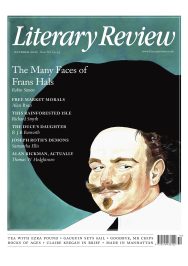Michael Burleigh
Once Upon a Time in Ukraine
Tales from the Borderlands: Making and Unmaking the Galician Past
By Omer Bartov
Yale University Press 392pp £20
Omer Bartov’s excellent book is a highly personal history of the small town of Buczacz, which was once on the Galician peripheries of the Austro-Hungarian Empire and now lies in Ukraine. One of the book’s many virtues is that, in seeking to examine the region as a whole, Bartov dispenses with the familiar viewpoints provided by places like Berlin, Vienna and St Petersburg, and even Warsaw and Kiev, and examines instead how things looked to successive generations of people, many of them Jewish, who scratched out modest livelihoods in this undistinguished town. At the same time, he includes accounts of those more adventurous souls who used new modes of transport, such as rail and steamer, to migrate far and near in search of more opportunities than this sleepy, pious backwater afforded them.
Bartov’s story concerns the ruled rather than the rulers. Those he writes about lived at a critical time, when what was a provincial town at the convergent margins of powerful European empires transitioned into being part of a new nation-state, the leaders of which were prickly about ethno-religious minorities. But the book is also a family memoir: Bucazcz was the home town of Bartov’s maternal ancestors, the more fortunate of whom managed to reach Palestine before the great darkness of Nazism descended. His last book, Erased, dealt with how, in their quest to retouch the reputations of murderous Banderite nationalists, the Ukrainian authorities have not overtaxed themselves in memorialising exterminated Jewish citizens. Now might not be the ideal moment to be reminded of Ukraine’s vexed relations with Jews, but there is no denying it.
Bartov was originally a military historian, specialising in the barbarism of the Nazi Wehrmacht. He has also published extensively on the Holocaust, notably on how it affected Galicia, the part of the Austro-Hungarian Empire most densely populated with Jews. His latest book is not, however, another addition to

Sign Up to our newsletter
Receive free articles, highlights from the archive, news, details of prizes, and much more.@Lit_Review
Follow Literary Review on Twitter
Twitter Feed
The son of a notorious con man, John le Carré turned deception into an art form. Does his archive unmask the author or merely prove how well he learned to disappear?
John Phipps explores.
John Phipps - Approach & Seduction
John Phipps: Approach & Seduction - John le Carré: Tradecraft; Tradecraft: Writers on John le Carré by Federico Varese (ed)
literaryreview.co.uk
Few writers have been so eagerly mythologised as Katherine Mansfield. The short, brilliant life, the doomed love affairs, the sickly genius have together blurred the woman behind the work.
Sophie Oliver looks to Mansfield's stories for answers.
Sophie Oliver - Restless Soul
Sophie Oliver: Restless Soul - Katherine Mansfield: A Hidden Life by Gerri Kimber
literaryreview.co.uk
Literary Review is seeking an editorial intern.